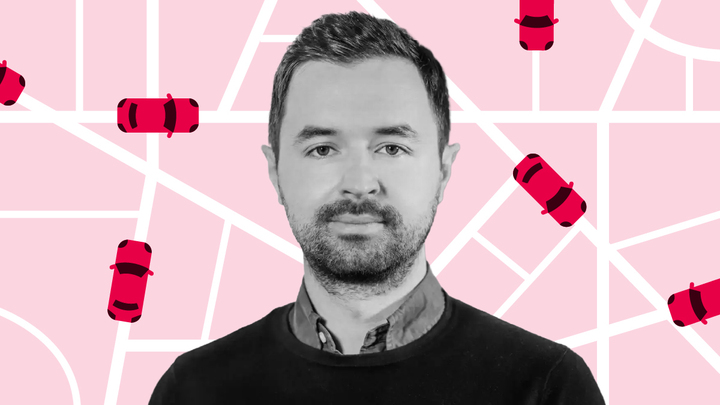
It has been a whirlwind year for Lennart Zipfel Shortly after stepping into his first CFO role at Freenow, the Hamburg-based taxi-hailing platform, he found himself steering the company through a landmark moment: its acquisition by Lyft.
In April 2025, the US-based ride-sharing company purchased Freenow for approximately €175m (£154m), a move that marked Lyft’s first expansion beyond North America and its entry into Europe’s highly competitive taxi market. In deals like this, even a small misstep in positioning or communication can undermine your market standing or give competitors an edge, Zipfel says.
With more than six years at Freenow – most recently as vice-president of finance – Zipfel felt confident stepping into the CFO role in a business he knew inside-out. His prior decade in consulting at EY had also given him deep insight into the complexities of large transactions. Still, he admits, the Lyft deal represented a significant moment of change for the company.
Here, Zipfel shares the four key lessons he learnt as CFO on preparing for a major sell-side acquisition.
Build resilient infrastructure
Zipfel’s first priority was ensuring that Freenow’s financial infrastructure could withstand the pressure of a major acquisition. “Even though it’s not the most glamorous part of the job, resilient infrastructure and established processes are critical,” he says.
Because the finance team had already built solid and reliable processes, they were able to switch their accounting and reporting framework seamlessly from International Financial Reporting Standards (IFRS) to US Generally Accepted Accounting Principles (GAAP) without major issues or delays. No one had to scramble or rebuild processes from scratch, Zipfel explains.
This foundation proved essential as the finance team found itself managing two demanding workstreams simultaneously: maintaining day-to-day financial stability while supporting a prolonged, stakeholder-heavy transaction process. “Not having good processes in place will come back to bite you,” Zipfel warns. “It can delay the deal, create unnecessary stress for the team and even put the success of the transaction at risk.”
Treat culture as a catalyst
Beyond the numbers, Zipfel emphasises the importance of human connection. “Spending time with Lyft’s executive and deal teams helped build trust, confirm cultural alignment and validate that both companies shared a common language and vision for the future.”
Despite geographical and organisational differences, he describes the integration as “remarkably smooth.” Lyft, he says, has proven to be a highly complementary partner, with a culture and growth ambition that mirrors Freenow’s own.
“Freenow’s workforce is incredibly diverse – with more than 50 nationalities. In many ways, this made the addition of our American colleagues feel natural rather than disruptive. The different time zones took a bit of adjusting. But while we’re different in detail, we were fully aligned in spirit – and that’s what matters.”
Cultivate a collaborative mindset
A crucial shift for any CFO leading a major transaction, Zipfel says, is moving from a defensive posture to a collaborative one. Rather than simply responding to requests, finance leaders should engage actively with counterparties to understand the reasoning behind their questions.
“Rather than giving a simple yes or no, take the time to explore the context. That’s what creates meaningful dialogue,” he explains.
Equally important is asking questions. “Understanding the other party’s intent makes communication far more impactful. In our early conversations with Lyft’s executive team, I would always ask: what are you trying to achieve? Why are you asking this? What solution do you have in mind? By uncovering the underlying purpose, I could provide forward-looking guidance that aligned with shared goals rather than just delivering data.”
Approached collaboratively, acquisitions can unlock powerful synergies. In the Freenow-Lyft deal, Lyft brought strengths in ride-sharing technology and marketplace platforms, while Freenow contributed deep local expertise, established regulatory relationships and a strong European presence.
On a personal level, Zipfel found the environment hugely invigorating. Working closely with senior counterparts at Lyft created opportunities to exchange ideas, best practices and strategic perspectives, making the experience “far more than a transactional process.”
Shift the focus toward profitable growth
The mobility industry is undergoing a shift away from “growth at all costs” toward a more disciplined model, centred on profitable expansion, Zipfel notes. Investors are no longer satisfied with rapid user growth alone; they expect clear plans showing when and how that growth will translate into sustainable returns.
“Navigating this transition can be challenging, but it creates an opportunity for finance leaders to demonstrate strategic foresight and strong financial leadership.”
The challenge, he says, is achieving profitable growth without compromising the partners and stakeholders who make that growth possible. “At Freenow, I’ve had to carefully balance commercial ambition with our responsibility to drivers, riders, cities and regulators. These groups are fundamental to long-term success.” When done well, he says, growth becomes not only profitable but also sustainable and inclusive.
For Zipfel, the acquisition marks both a professional milestone and the start of an exciting new chapter for Freenow. While it is still early days, the impact of the partnership with Lyft is already becoming visible and he believes the best is still ahead.

It has been a whirlwind year for Lennart Zipfel Shortly after stepping into his first CFO role at Freenow, the Hamburg-based taxi-hailing platform, he found himself steering the company through a landmark moment: its acquisition by Lyft.
In April 2025, the US-based ride-sharing company purchased Freenow for approximately €175m (£154m), a move that marked Lyft’s first expansion beyond North America and its entry into Europe’s highly competitive taxi market. In deals like this, even a small misstep in positioning or communication can undermine your market standing or give competitors an edge, Zipfel says.
With more than six years at Freenow – most recently as vice-president of finance – Zipfel felt confident stepping into the CFO role in a business he knew inside-out. His prior decade in consulting at EY had also given him deep insight into the complexities of large transactions. Still, he admits, the Lyft deal represented a significant moment of change for the company.





